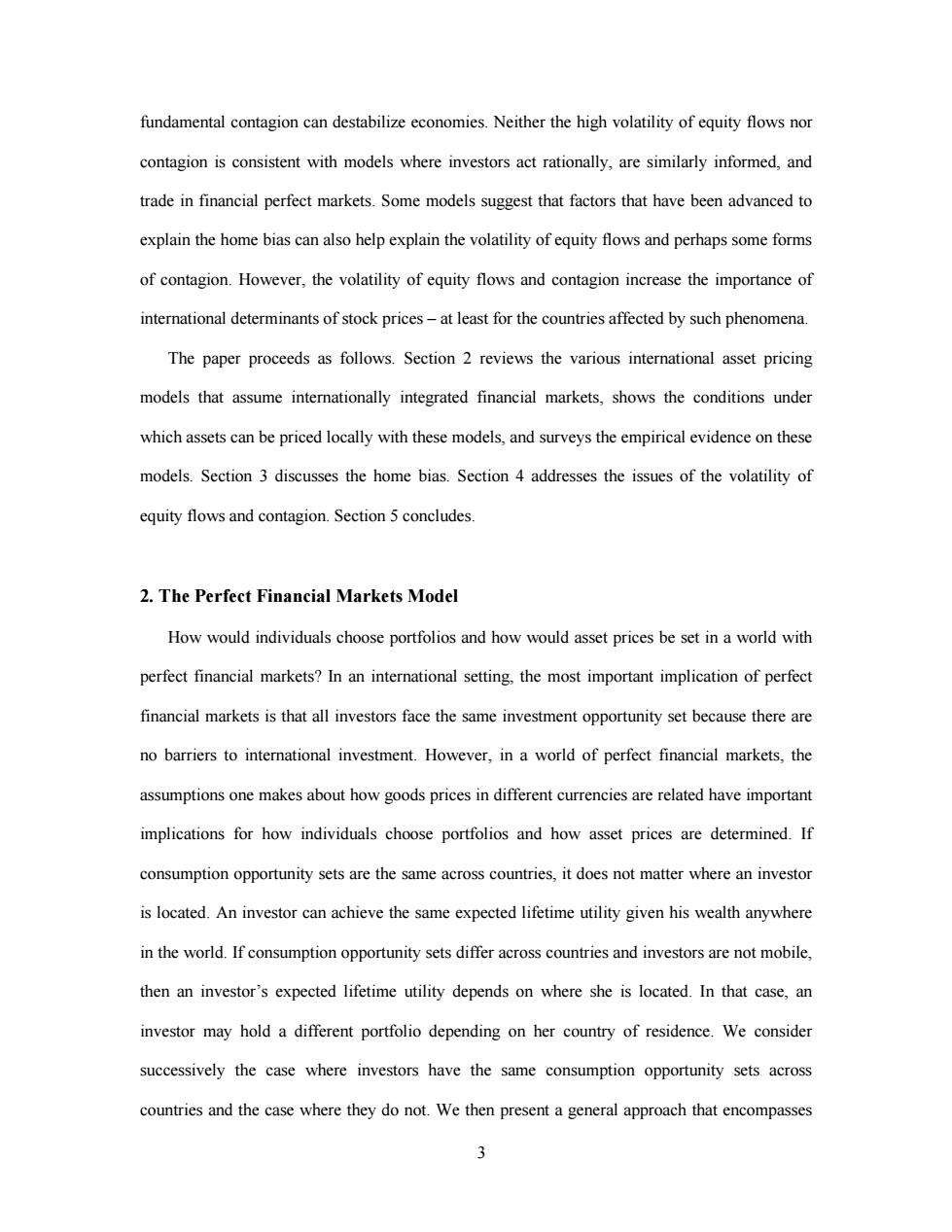正在加载图片...

fundamental contagion can destabilize economies.Neither the high volatility of equity flows nor contagion is consistent with models where investors act rationally,are similarly informed,and trade in financial perfect markets.Some models suggest that factors that have been advanced to explain the home bias can also help explain the volatility of equity flows and perhaps some forms of contagion.However,the volatility of equity flows and contagion increase the importance of international determinants of stock prices-at least for the countries affected by such phenomena. The paper proceeds as follows.Section 2 reviews the various international asset pricing models that assume internationally integrated financial markets,shows the conditions under which assets can be priced locally with these models,and surveys the empirical evidence on these models.Section 3 discusses the home bias.Section 4 addresses the issues of the volatility of equity flows and contagion.Section 5 concludes. 2.The Perfect Financial Markets Model How would individuals choose portfolios and how would asset prices be set in a world with perfect financial markets?In an international setting,the most important implication of perfect financial markets is that all investors face the same investment opportunity set because there are no barriers to international investment.However,in a world of perfect financial markets,the assumptions one makes about how goods prices in different currencies are related have important implications for how individuals choose portfolios and how asset prices are determined.If consumption opportunity sets are the same across countries,it does not matter where an investor is located.An investor can achieve the same expected lifetime utility given his wealth anywhere in the world.If consumption opportunity sets differ across countries and investors are not mobile, then an investor's expected lifetime utility depends on where she is located.In that case,an investor may hold a different portfolio depending on her country of residence.We consider successively the case where investors have the same consumption opportunity sets across countries and the case where they do not.We then present a general approach that encompasses 33 fundamental contagion can destabilize economies. Neither the high volatility of equity flows nor contagion is consistent with models where investors act rationally, are similarly informed, and trade in financial perfect markets. Some models suggest that factors that have been advanced to explain the home bias can also help explain the volatility of equity flows and perhaps some forms of contagion. However, the volatility of equity flows and contagion increase the importance of international determinants of stock prices – at least for the countries affected by such phenomena. The paper proceeds as follows. Section 2 reviews the various international asset pricing models that assume internationally integrated financial markets, shows the conditions under which assets can be priced locally with these models, and surveys the empirical evidence on these models. Section 3 discusses the home bias. Section 4 addresses the issues of the volatility of equity flows and contagion. Section 5 concludes. 2. The Perfect Financial Markets Model How would individuals choose portfolios and how would asset prices be set in a world with perfect financial markets? In an international setting, the most important implication of perfect financial markets is that all investors face the same investment opportunity set because there are no barriers to international investment. However, in a world of perfect financial markets, the assumptions one makes about how goods prices in different currencies are related have important implications for how individuals choose portfolios and how asset prices are determined. If consumption opportunity sets are the same across countries, it does not matter where an investor is located. An investor can achieve the same expected lifetime utility given his wealth anywhere in the world. If consumption opportunity sets differ across countries and investors are not mobile, then an investor’s expected lifetime utility depends on where she is located. In that case, an investor may hold a different portfolio depending on her country of residence. We consider successively the case where investors have the same consumption opportunity sets across countries and the case where they do not. We then present a general approach that encompasses